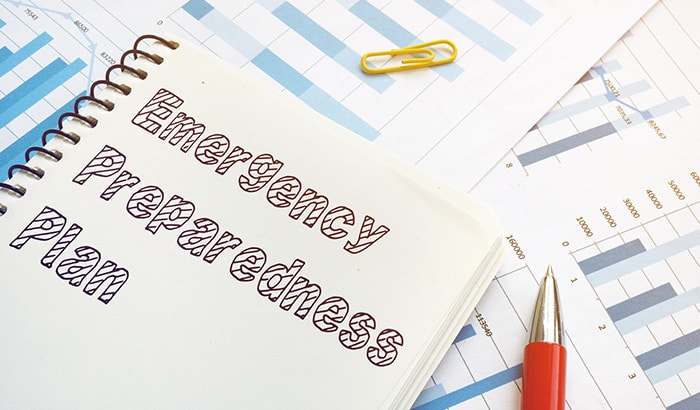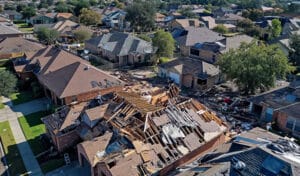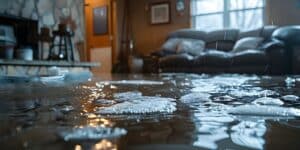A long-term power outage can change the game in an emergency. While many emergencies only require evacuation, and you can quickly return to your home, long-term power outages come with extra steps.
Not only does a power outage leave you in darkness, but it puts a lot of stuff at risk. Without power, the food in your refrigerator can spoil. Refrigerated medications might need replacement. And electronic devices that rely on battery power need to be conserved so they last as long as possible.
We’ve already talked about emergency preparedness plans; today, we’re discussing how a long-term power outage can affect that plan and how you can plan accordingly. Keep reading to learn how to respond during a long-term power outage.
Prepare for a Long-Term Power Outage
It’s easier to know how to respond during a power outage if you’re already prepared for one. Thinking about what you would do – and what you would need in order to do those things – will help you prepare for a power outage, even if you don’t experience one. Simply put, preparation is everything when it comes to handling an emergency.
So, how do you prepare?
Let’s break it down by category.
Food
We need basic sustenance to survive, and food is a significant part of that. But if the power goes out, your food is at risk. And if the power is out for days, you’ll need a backup plan to stay nourished.
If the power outage is part of a natural disaster, you likely won’t be the only one struggling. But if the outage is just in your neighborhood overnight, it’s not as big of a deal.
To keep your body nourished, we recommend keeping non-perishable foods on hand for emergencies. Canned beans, vegetables, fruit packed in fruit juice, cereal, peanut butter, nuts, crackers, snack bars, and shelf-stable milk are staples to start with. You’ll also want a manual can opener to open canned foods.
You can make yummy meals with these shelf-stable foods, too. Overnight oats, gazpacho, tuna sandwiches, or even bean salad can keep you feeling satisfied, even without power.
Having those shelf-stable foods on hand will prevent you from needing to open the fridge door prematurely. The longer the fridge stays shut, the longer the food will stay fresh.
How long will food stay fresh?
That depends on what it is.
Foods like bread, butter, fruit, veggies, jam, and hard cheeses won’t turn right away. So don’t toss those apples or avocados. But you will need to toss fresh foods like meat and dairy products if they’re left unrefrigerated for 4 hours, or their internal temperature rises to 40 degrees or above.
As for freezer foods, they’ll last a bit longer. If your fridge is packed full, you’re safe for up to 48 hours. A half-full fridge is good for 24 hours. If you want to make it last longer, fill up some containers with water and place them in the freezer. Once frozen solid, they’ll keep your food fresh for longer.
Medications
Depending on your health condition, you might need refrigerated medications that you\ must replace if they are exposed to room temperature for too long. If it’s a medicine you can go without for a day or two, you might not be too worried about it. But if the medication is essential and must be taken every day, you’ll want to have a backup plan.
Our first recommendation is to talk to your healthcare provider about your medication and alternate ways you can store it. They might have great suggestions you haven’t thought of. Chances are you won’t be the first person to ask them, so they’ll have had some time to consider it over the years.
Our second recommendation is to ask for a backup prescription. Call your doctor; tell them your power went out and you’re concerned about your medication. Your provider will likely send a new prescription to your pharmacy so that you can take your medicine when you need it.
It’s unfortunate if the medicine is spoiled, especially if you have a high copay. So you might consider getting a freezer chest and filling it up with ice to help your medication stay good for as long as possible. But this is only a temporary solution, and ultimately, it’s not worth risking it and getting sick.
Generators & Appliances
If you have a generator, we recommend using it, as this can restore power to your appliances and keep food and medicine fresh for longer. Just keep the generator at least 20 feet away from your home. Why? Because generators emit carbon monoxide fumes, which are invisible and odorless and can kill you in minutes.
If you don’t have a generator, we recommend unplugging all your appliances. There can be surges or sparks of electricity when there’s a power outage as power is restored, whether only for a moment or for good.
Those surges can damage or destroy your appliances. So, while it might make the most sense to keep your appliances plugged in, it’s much better to unplug them so they won’t need repair or replacement.
Black Diamond Restoration
Unfortunately, power outages strike, with some lasting for days due to local or national disasters. Following the advice in this blog will undoubtedly help you cope with a long-term power outage, but there’s no guarantee that your home will remain unfazed by a disaster.
If you find yourself displaced or unable to comfortably live in your home due to damage, rest assured you’re in good hands. Black Diamond Restoration is highly experienced in repairing and restoring homes from water, fire, mold, sewer, storm, and biohazard damage. If that’s what you’re dealing with, we can help!
Black Diamond Restoration is located in Murray, Utah, and services the greater Salt Lake and Utah counties areas. You can reach us at 801.512.4194 or visit our website to learn more about us. We’re here for you!







